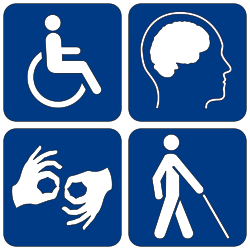Disability
| Checking our privilege Social justice |
| Not ALL of our articles |
A disability is a restriction or lack of ability to perform an action within the normal range of human ability. Under U.S. law, a person with a disability is "Any person who has a physical or mental impairment which substantially limits one or more of such person's major life activities, has a record of such an impairment, or is regarded as having such an impairment."[1]
Types of disabilities[edit]
Disabilities could be sorted into four broad types:
- Mobility
- Neurological
- Hearing
- Vision
Something counts as a disability if it results in the person struggling with everyday tasks (such as work, school, socializing, basic chores, or going out of the house). Some long-term medical issues, such as emphysema, can cause one to become disabled. Disabilities may be temporary or permanent. Some are inborn and some are acquired.
Disabilities are not always easily apparent. For example, some people with mobility impairments can walk for short distances without mobility equipment, and many neurological conditions are completely invisible. Disability can also vary from day to day. For example, someone might be able to walk using crutches on a good day while they need a wheelchair on a bad day. This doesn't mean they're "getting better" or "faking it," just that their abilities vary day to day.[note 1]
Disability accommodations can help level the playing field to give disabled people equal opportunity, especially for conditions that are incurable or difficult to treat.
Disability in history[edit]
In many traditional societies, those with disabilities were often held to possess supernatural abilities. Since the Industrial Revolution, those with disabilities have been, at best, pitied, and at worst discriminated against or killed. For a long time, people with recognizable disabilities have been relegated to beggardom, even if they were still capable of performing work. Eugenics has been particularly interested in eliminating mental disabilities in society through forced sterilization.[2] In Nazi Germany, people with neurological disabilities were victims of the Holocaust.
Not all of it has been bad, though. Researchers have discovered the 1500-year-old body of a child with Down syndrome. The child was buried according to cultural customs, suggesting that they were a beloved and valued member of the community and their untimely death was mourned.[3]
Legal[edit]
In most of the developed world, it is now illegal to discriminate against people with disabilities unless the disability in question would adversely affect job performance even with reasonable accommodations. Moreover, businesses must now make accommodations for patrons with such disabilities, within reason. However, it is felt within the disabled community that many businesses grossly exaggerate the costs of accommodation in order to get away with continued discrimination as well as misrepresent nice-to-have job requirements (that can't be the reason to decline a candidate, according to anti-discrimination laws) as essential job functions (that can be used legally to decline a disabled candidate).
Social vs medical model of disability[edit]
The medical model of disability[edit]
According to the medical model, disability is caused by a defect in someone's brain or body. The disability can be "corrected" through routes like medication, intensive therapy, or surgery. If it cannot be erased, then according to the medical model, there is little that can be done.[4]
This model falls short when we consider traits like nearsightedness. Some people have objectively bad vision, so they wear glasses. Does that make them disabled?
The social model of disability[edit]
“”As a person with a mobility impairment, I am disabled by steps, stairs, escalators, being denied computer access as I can’t write by hand, inaccessible housing, and so on. To me, a flight of stairs without a lift as an alternative is the equivalent of right-clicking me and selecting “disable Lisa.”
|
| —Lisa Egan, a wheelchair user[5] |
According to the social model of disability, disability exists because of (1) an impairment or inability, and (2) societal failure to accommodate that inability.[6] This model describes the distinction between a physical impairment and the capabilities of a person with resources. For example, someone who wears glasses is not disabled, because society has offered an acceptable workaround. A blind person, however, may not have access to braille texts or auditory signals, and thus is disabled.
Using this model, we can see that addressing disability doesn't mean changing the people, but instead giving them equal opportunities. Accessible toilets, curb cuts, audiobook or braille versions of books, subtitles on movies, supported decision-making, sensory-friendly work environments, and other accommodations are examples of ways to include people with disabilities.
The social model has been criticized for underplaying the role of impairments.[7]
See also[edit]
Notes[edit]
- ↑ Everyone's abilities vary from day to day. For example, you'd probably score better on a test if you had slept well and eaten a good breakfast versus if you stayed up all night drinking Red Bull until you were incoherent.
References[edit]
- ↑ http://www.lectlaw.com/def/i032.htm
- ↑ http://www.nature.com/scitable/forums/genetics-generation/america-s-hidden-history-the-eugenics-movement-123919444
- ↑ Oldest Case of Down Syndrome Discovered in 1,500-Year-Old Skeleton - ABC News
- ↑ Social model of disability
- ↑ I’m Not a Person with a Disability. I’m a Disabled Person
- ↑ Autistic Dreams: Yes, Autism is a Disability!
- ↑ https://www.tandfonline.com/doi/abs/10.1080/09687599.2013.818773

